Is That Text a Scam? Korean for Staying Safe Online!
Hello! Welcome to [Maeil Hangeul], here to upgrade your Korean skills!
Have you ever received a strange text message in Korean and wondered if it was safe to open? Today, we’re going to learn some essential Korean vocabulary to help you understand news about cybercrime and protect yourself from online scams. Lately in Korea, there’s been a lot of news about new types of online fraud, so learning these words is not only great for your Korean skills but also super useful for your daily life. Let’s dive in and become smart online surfers!
Core Expressions You Must Know
Here are some key terms you’ll see in news articles and warning messages about online safety.
- 한국어 표현: 스미싱 (Seu-mi-sing)
- 발음 [Romanization]: Seu-mi-sing
- 영어 뜻: Smishing (a combination of SMS and Phishing)
- 상세 설명: This is a very common word in Korea for scams sent via text messages. Scammers send a text with a link, and if you click it, malware can be installed on your phone to steal your personal information. These texts often pretend to be for a package delivery, a wedding invitation, or a bank notification. It’s an informal, everyday word you’ll hear all the time.
- 한국어 표현: 개인정보 유출 (Gae-in-jeong-bo yu-chul)
- 발음 [Romanization]: Gae-in-jeong-bo yu-chul
- 영어 뜻: Personal information leak / data breach
- 상세 설명: This is a more formal phrase you’ll encounter in news articles or official announcements. Let’s break it down: 개인 (gae-in) means ‘personal’, 정보 (jeong-bo) means ‘information’, and 유출 (yu-chul) means ‘leak’ or ‘spill’. Scammers often aim for a gae-in-jeong-bo yuchul.
- 한국어 표현: 의심스러운 링크 (Ui-sim-seu-reo-un ling-keu)
- 발음 [Romanization]: Ui-sim-seu-reo-un ling-keu
- 영어 뜻: A suspicious link
- 상세 설명: This is a crucial phrase for prevention! 의심스럽다 (ui-sim-seureop-da) means ‘to be suspicious’ or ‘doubtful’, and 링크 (ling-keu) is the Konglish word for ‘link’. The number one rule to prevent smishing is: 의심스러운 링크는 클릭하지 마세요! (Don’t click suspicious links!).
- 한국어 표현: 예방하다 (Ye-bang-ha-da)
- 발음 [Romanization]: Ye-bang-ha-da
- 영어 뜻: To prevent
- 상세 설명: This is a very useful verb. It’s used for preventing all sorts of negative things, like diseases (질병을 예방하다), accidents (사고를 예방하다), and of course, crime (범죄를 예방하다). You can use it to talk about how to stop scams before they happen.
Example Dialogue
Let’s see how these words are used in a real conversation. Two friends, A (Mina) and B (Hajun), are talking.
A (Mina): 하준아, 너 혹시 이 문자 메시지 받았어? 유명 배우 결혼식 모바일 청첩장이래.
Hajun, did you get this text message? It says it’s a mobile wedding invitation for a famous actor.
B (Hajun): 잠깐만! 그거 절대 누르지 마! 요즘 유행하는 스미싱일 가능성이 높아.
Wait! Don’t click that! It’s highly likely to be the smishing scam that’s popular these days.
A (Mina): 정말? 주소가 좀 이상하긴 했어. 이런 게 의심스러운 링크구나.
Really? The URL did look a bit strange. So this is what a suspicious link looks like.
B (Hajun): 응. 클릭하면 개인정보 유출될 수도 있어. 사이버 범죄는 항상 예방하는 게 중요해.
Yep. If you click it, you could have a personal information leak. It’s always important to prevent cybercrime.
Culture Tip & Trend Deep Dive
In Korea, smishing scams are getting very creative. They often impersonate companies everyone uses, like the delivery service Coupang (쿠팡) or the post office 우체국 택배 (Ucheguk Taekbae), with messages like “Your package could not be delivered. Please check the address.”
Here’s a tip to sound like a local: When Koreans see a suspicious message, they often share a screenshot with friends or on social media and ask, “이거 스미싱 맞죠? ㅋㅋ” (Igeo seumising matjyo? ㅋㅋ), which means “This is smishing, right? LOL”. It’s a way to warn others and laugh at the absurdity of the scam attempt. If you watch the Korean news on channels like YTN, you’ll often see special reports on how to identify the latest smishing techniques. It’s great practice for your new vocabulary!
Review & Practice!
Great job today! We learned some vital vocabulary to stay safe online in Korea: 스미싱 (smishing), 개인정보 유출 (personal information leak), 의심스러운 링크 (suspicious link), and 예방하다 (to prevent).
Now, let’s test your knowledge!
- Fill in the blank:
모르는 사람이 보낸 _________는 절대 클릭하면 안 돼요.
(You should never click a _________ sent by a stranger.) -
Make a short sentence:
Using the verb 예방하다, how would you say, “We have to prevent smishing.” in a polite way?
Leave your answers in the comments below! Stay safe, and see you next time at [Maeil Hangeul]






